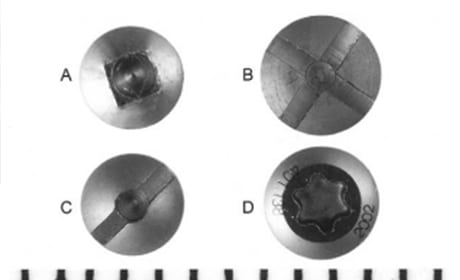
Screw Head Design: An Experimental Study to Assess the Influence of Design on Performance
Abstract
Purpose: This experimental study was designed to examine whether screw head design influenced the angle of application of a screwdriver at which failure of engagement or stripping of the screw head occurred.
Materials and Methods: Four different screw head designs (slot, cross, square, star) were tested in a custom-made jig that was designed to enable the screws to be tested over a range of angles of application of the respective screwdrivers, to determine whether the screw head design influenced the torque value at which the screw head stripped or failure of driver engagement occurred.
Results: The results fell clearly into 2 groups: The slot and cross designs gave the highest torque values at all angles, while the torque values for the square and star designs dropped to a low value with increasing angulation between the screw and driver. These differences were significant (P < .001).
Conclusions: Although this experimental situation cannot be entirely extrapolated to the clinical situation, it indicates that the slot or cross design may offer an advantage in regions of difficult access where the angulation of the screwdriver to the screw may of necessity be increased.
© 2004 American Association of Oral and Maxillofacial Surgeons J Oral Maxillofac Surg 62:473-478, 2004.
Click here to carry on reading this article